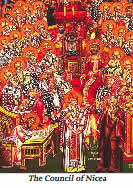That Clumsy Word in the Creed: CONSUBSTANTIAL
There is a word in the new translation of the Nicene Creed that is bothering some of the people praying it. The word seems heavy, clumsy, unbiblical and overly technical; not the sort of word likely to be used in conversation. The awkward word is “consubstantial” used in the sentence about the Jesus being “true God from true God, begotten, not made, consubstantial with the Father.”
Now it is only the translation that is new, not the Creed. That first part of the Creed dates back to the Council of Nicaea (325AD). It was composed in Greek, and was not originally intended as part of the liturgy. It only entered the Roman Mass centuries later, in 1014 AD, in Latin translation. The Latin of our phrase above is: “Deum verum de Deo vero, genitum non factum, consubstantialem Patri.”
That phrase was also translated in the English text of the Creed that we have been praying since 1974. It was rendered as:
“true God from true god, begotten not made, one in Being with the Father”

Given the dynamic of the new translation it will not be a surprise that this “new” word corresponds exactly to a single word of the Latin text. Less obvious is that the awkwardness and clumsiness is also utterly accurate.
The Creed was written to rebut the Arian heresy which proposed that the Son of God was a lesser divinity than God the Father. Arius, a priest from Alexandria, taught that God the Son was created by God the Father at the beginning of Creation as the first of his works. This put God the Son among us creatures and quite distinct from God the Father. This was not a question the biblical authors had ever considered. Precise, subtle, and new thinking was needed to address the issue. The Creed uses a string of images and statements to assert the equal glory of God the Father and God the Son. When you light one candle from another, the first is not diminished, nor is the second lesser – hence “light from light”. Children are “begotten not made” – they belong to your substance, come from your very being.
The single most important word in the Creed was the one we are tripping over. Homoousios was the Greek word the Bishops of Nicaea chose as the hallmark of orthodoxy. It was controversial at the time because it is not in the Bible. It was a technical term from philosophy. St Athanasius, who was at the Council, was the champion of that word after Nicaea but it was a long time before it was universally accepted in the Church.
Consubstantialem was “invented” as an equivalent to homoousios by Tertullian in a word he wrote about 200 AD. Tertullian, the first of the great Patristic authors to write in Latin, coined several theological terms including “Trinitas”.
“Consubstantial” is a clumsy word, but it is a very important one. It carries a lot of theological freight and much history. If your tongue trips on it, know that you are part of a long and glorious tradition.

 Entries(RSS)
Entries(RSS)
I do not have any comment but need to be updated in all new findings in our catholic faith thank and hope to receiving news from your end
The different in the word HOMOOUSION and homoosious
HOMOOUSION - A Christian supporting the Council of Nicaea's Trinitarian definition of Jesus the Son of God as consubstantial with God the Father
HOMOOUSIOS - Of the same nature. Used to describe the one nature shared by the Father, Son, and Holy Spirit.